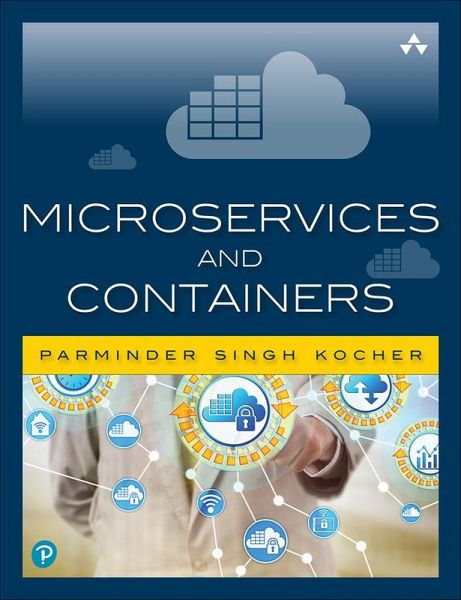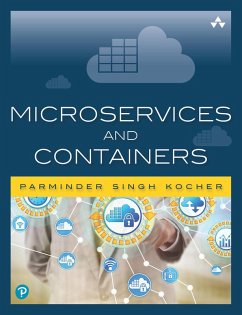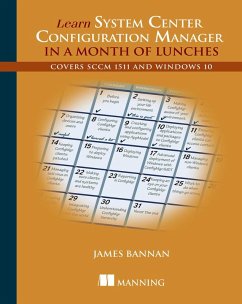
Microservices and Containers (eBook, ePUB)

PAYBACK Punkte
11 °P sammeln!
Transition to Microservices and DevOps to Transform Your Software Development EffectivenessThanks to the tech sector's latest game-changing innovations-the Internet of Things (IoT), software-enabled networking, and software as a service (SaaS), to name a few-there is now a seemingly insatiable demand for platforms and architectures that can improve the process of application development and deployment.In Microservices and Containers, longtime systems architect and engineering team leader Parminder Kocher analyzes two of the hottest new technology trends: microservices and containers. Together,...
Transition to Microservices and DevOps to Transform Your Software Development Effectiveness
Thanks to the tech sector's latest game-changing innovations-the Internet of Things (IoT), software-enabled networking, and software as a service (SaaS), to name a few-there is now a seemingly insatiable demand for platforms and architectures that can improve the process of application development and deployment.
In Microservices and Containers, longtime systems architect and engineering team leader Parminder Kocher analyzes two of the hottest new technology trends: microservices and containers. Together, as Kocher demonstrates, microservices and Docker containers can bring unprecedented agility and scalability to application development and deployment, especially in large, complex projects where speed is crucial but small errors can be disastrous.
Learn how to leverage microservices and Docker to drive modular architectural design, on-demand scalability, application performance and reliability, time-to-market, code reuse, and exponential improvements in DevOps effectiveness. Kocher offers detailed guidance and a complete roadmap for transitioning from monolithic architectures, as well as an in-depth case study that walks the reader through the migration of an enterprise-class SOA system.
Whether you are a software architect/developer or systems professional looking to move on from older approaches or a manager trying to maximize the business value of these technologies, Microservices and Containers will be an invaluable addition to your library.
Register your product at informit.com/register for convenient access to downloads, updates, and/or corrections as they become available.
Thanks to the tech sector's latest game-changing innovations-the Internet of Things (IoT), software-enabled networking, and software as a service (SaaS), to name a few-there is now a seemingly insatiable demand for platforms and architectures that can improve the process of application development and deployment.
In Microservices and Containers, longtime systems architect and engineering team leader Parminder Kocher analyzes two of the hottest new technology trends: microservices and containers. Together, as Kocher demonstrates, microservices and Docker containers can bring unprecedented agility and scalability to application development and deployment, especially in large, complex projects where speed is crucial but small errors can be disastrous.
Learn how to leverage microservices and Docker to drive modular architectural design, on-demand scalability, application performance and reliability, time-to-market, code reuse, and exponential improvements in DevOps effectiveness. Kocher offers detailed guidance and a complete roadmap for transitioning from monolithic architectures, as well as an in-depth case study that walks the reader through the migration of an enterprise-class SOA system.
- Understand how microservices enable you to organize applications into standalone components that are easier to manage, update, and scale
- Decide whether microservices and containers are worth your investment, and manage the organizational learning curve associated with them
- Apply best practices for interprocess communication among microservices
- Migrate monolithic systems in an orderly fashion
- Understand Docker containers, installation, and interfaces
- Network, orchestrate, and manage Docker containers effectively
- Use Docker to maximize scalability in microservices-based applications
- Apply your learning with an in-depth, hands-on case study
Whether you are a software architect/developer or systems professional looking to move on from older approaches or a manager trying to maximize the business value of these technologies, Microservices and Containers will be an invaluable addition to your library.
Register your product at informit.com/register for convenient access to downloads, updates, and/or corrections as they become available.
Dieser Download kann aus rechtlichen Gründen nur mit Rechnungsadresse in A, B, BG, CY, CZ, D, DK, EW, E, FIN, F, GR, HR, H, IRL, I, LT, L, LR, M, NL, PL, P, R, S, SLO, SK ausgeliefert werden.













